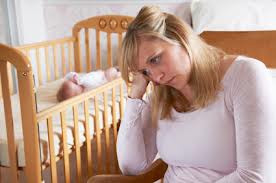Post-Partum Depression

Post-Partum depression (Image Source)
How does post-partum depression happen and why? This kind of depression is similar to other forms of depression, except it happens after giving birth. It is not totally clear why some women develop PPD (as it is called) while other women may have the “baby blues” (a normal affliction including mood swings, crying jags, mild depression/ sleep problems/loss of appetite) and others have no symptoms of depression at all. As with any form of depression, if you have had it in the past you may be more likely to develop it during or after your pregnancy. If you had PPD with a previous pregnancy that will also increase your risk. Other risks include: significant stresses in the past year, marital conflict, insufficient support system, or unplanned pregnancy.
Some of the symptoms of PPD include loss of appetite, insomnia, intense anger or irritability, overwhelming fatigue, feelings of guilt, shame, or inadequacy, mood swings, difficulty bonding with your baby, withdrawl from family and friends, and thoughts of harming yourself or your baby. This is a long and scary list! The main thing to remember is that getting information as in reading this post or other information online, and getting early treatment are very helpful and important. And since isolation is a hallmark of depression, finding ways to reach out are extremely helpful.
To read more go to post-partum-depression.com
Phyllis Klein, LCSW


Comments
Post-Partum Depression — No Comments
HTML tags allowed in your comment: <a href="" title=""> <abbr title=""> <acronym title=""> <b> <blockquote cite=""> <cite> <code> <del datetime=""> <em> <i> <q cite=""> <s> <strike> <strong>